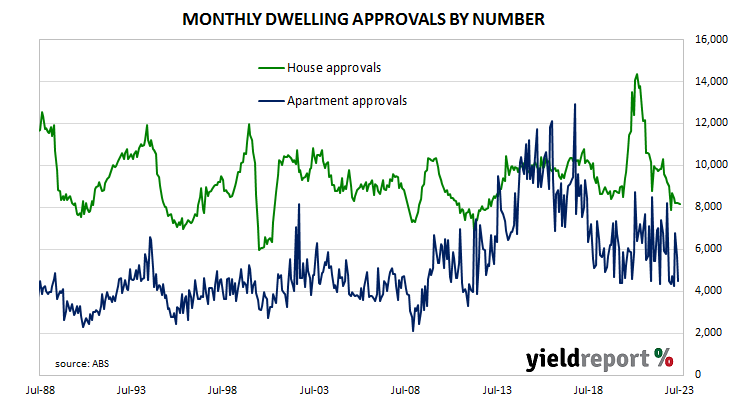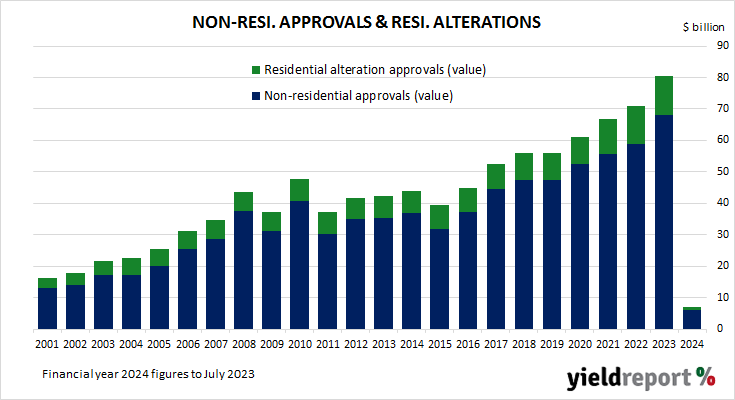Summary: Home approval numbers down 8.1% in July, under expectations; 10.6% lower than July 2022; Westpac: “stabilising somewhat”; Westpac: approvals at very low level by historical standards; house approvals down 0.1%, apartments down 19.9%; non-residential approvals down 27.8% in dollar terms, residential alterations down 4.4%.
Building approvals for dwellings, that is apartments and houses, headed south after mid-2018. As an indicator of investor confidence, falling approvals had presented a worrying signal, not just for the building sector but for the overall economy. However, approval figures from late-2019 and the early months of 2020 painted a picture of a recovery taking place, even as late as April of that year. Subsequent months’ figures then trended sharply upwards before falling back in 2021, 2022 and the first half of 2023.
The Australian Bureau of Statistics has released the latest figures from July which show total residential approvals fell by 8.1% on a seasonally-adjusted basis. The fall was a greater one than the 1.0% decline which had been generally expected and slightly greater than June’s 7.9% fall after revisions. Total approvals fell by 10.6% on an annual basis, up from the previous month’s revised figure of -18.0%. Monthly growth rates are often volatile.
“Looking through recent volatility, approvals do look to be stabilising somewhat,” said Westpac senior economist Matthew Hassan. “Total approvals are still up 7.1% on a rolling 3-month basis, despite the back-to-back falls, with non-high rise approvals holding about flat since April.”
The figures came out on the same day as the latest quarter’s construction work done report. Commonwealth Government bond yields fell and, by the close of business, the 3-year ACGB yield had lost 4bps to 3.78%, the 10-year yield had fallen 3bps to 4.07% while the 20-year yield finished 1bp at 4.42%.
In the cash futures market, expectations regarding further rate rises eased. At the end of the day, contracts implied the cash rate would barely change from the current rate of 4.07% and average 4.07% in September and 4.095% in October. February 2024 contracts implied a 4.175% average cash rate, as did May 2024 contracts, 11bps more than the current rate.
“While the recent signs of an underlying stabilisation in activity may be comforting, approvals are at a very low level by historical standards, particularly when viewed relative to the size of the dwelling stock and pace of population growth,” Hassan added.
Approvals for new houses slipped by 0.1% over the month, up from June’s 0.8% fall. On a 12-month basis, house approvals were 16.8% lower than they were in July 2022, up from June’s comparable figure of -16.5%.
Apartment approval figures are usually a lot more volatile and July’s total fell by 19.9% after a 17.1% fall in June. The 12-month growth rate rose from June’s revised rate of -20.1% to 3.5%.
Non-residential approvals decreased by 27.8% in dollar terms over the month but were 45.9% higher on an annual basis. Figures in this segment also tend to be rather volatile.
Residential alteration approvals fell by 4.4% in dollar terms over the month and were 3.7% lower than in July 2022.



